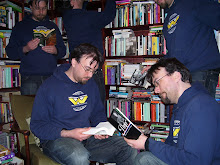A guest post by Lisa Morrison, who previously wrote about the art and reality of Last Suppers.
As an eight-year-old girl in 1984, I didn’t like my teacher and was increasingly anxious about going to school. A local librarian recommended Ramona the Brave to my mum, among a selection of books that might help me. Here a lifelong love of Ramona books began.
In the pages of this children’s novel, I felt understood, entertained and inspired to be courageous. To this day, I still marvel at how author Beverly Cleary knew, or could remember, what it was like to be a child: the worries and enthusiasms, frustrations and misunderstandings.
I read all the other Ramona books, was super excited when a new one appeared and was never disappointed by them. The final Ramona book, Ramona’s World, was released around the time I was having problems with someone at work and about to be married. It was so comforting to return to those characters I loved so much.
I’ve always read Ramona books as a cosy treat as an adult. But the even greater joy is how much my own daughter, now seven, also loves them. Now, as a parent, I also find myself identifying with Ramona’s mum, Mrs Quimby. Beverly Cleary was just as on the mark about how adults act and the universal things they say to children. The Quimby’s money worries, scheduling issues, car breakdowns and job dissatisfaction seem so adult and serious now. But, as a child reader, I hardly noticed them.
Every Ramona reader would have their own remembrances and fond feelings. So it is such a joy to see the Ramona books and their illustrations celebrated in Anna Katz's The Art of Ramona Quimby. And Beverly Cleary, at 104, is still around to see it.
Anna Katz takes us through each Ramona book in turn, showcasing the work of the five main illustrators that have drawn this spunky girl over the years. They are Louis Darling, Alan Tiegreen, Joanne Scribner, Tracey Dockray and Jacqueline Rogers. Interestingly, the work of Thelma Lambert, who illustrated my edition of Beezus and Ramona, is not mentioned.
 |
| Cover art by Joanne Scribner |
The artwork is always at the forefront, combined with summaries and extracts and spare commentary about how different illustrators have interpreted the same pivotal episodes in each book.
 |
| Artwork by Alan Tiegreen |
Alan Tiegreen’s illustrations will always be my Ramona; and it was lovely to see some of the covers I knew as a child again here, which are different to the paperbacks I own.
 |
| Artwork by Louis Darling |
Louis Darling was the original Ramona illustrator, and his depictions of the younger, very 1950s, Ramona are also delightful. I hadn’t seen many different illustrators’ work before this collection, and am particularly taken with the recent imaginings of Ramona by Jacqueline Rogers. They are detailed, emotion-filled and endearing. They capture Ramona more realistically and less cartoonishly, and I want to go out and get editions drawn by her. Illustrations by Tracey Dockray and Joanne Scribner have their charms but don’t seem quite right to me.
 |
Cover designs by Tracy Dockray |
The Tiegreen image of Ramona’s father trying to remove burrs from Ramona’s hair after she made herself a nature crown—and which I recall making into a shoebox diorama for Mr Parson’s class in Year 5—will always stay with me.
 |
| Artwork by Alan Tiegreen (above) and (below) the same scene illustrated by Tracy Dockray |
Readers who have not read Beverly Cleary’s compelling memoirs, A Girl from Yamhill and My Own Two Feet, will enjoy discovering that Cleary, like Ramona, also ate the first bite from many an apple and discarded the remains and was also tormented by hearing a teacher call her a nuisance.
Inclusions of facsimiles of letters between Louis Darling and Beverly Clear at the end of the book are so enjoyable, as is the afterword by Jacqueline Rogers about being chosen to illustrate the Ramona books.
 |
| Click to embiggen |
The Art of Ramona Quimby is a joy for any Ramona fan!











1 comment:
Actually, I started to remember Beverly Cleary when Jeff Bezos became prominent.
When I last saw Ramona, she had cold feet, and Henry whats-his-name was pulling her home on his sled.
Post a Comment